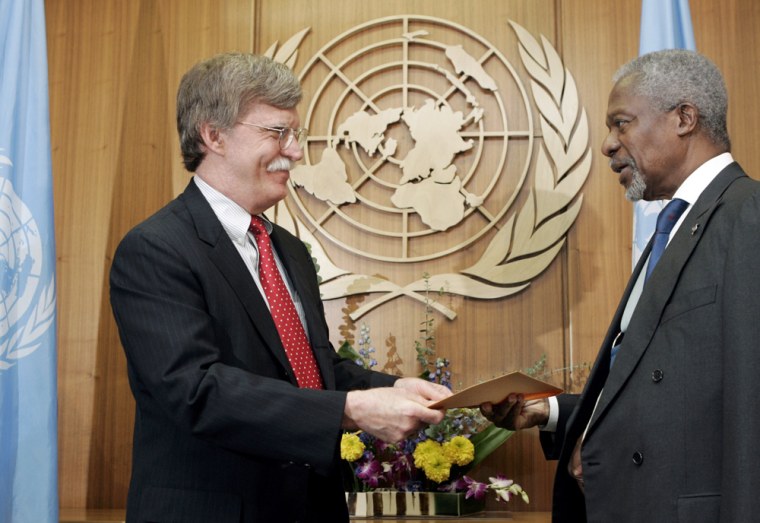John Bolton presented his credentials Tuesday as U.S. ambassador to the United Nations, a job which will challenge him to work with diplomats from 190 nations in a place he has called irrelevant.
“Glad to be here,” the controversial diplomat told Secretary-General Kofi Annan before handing over his letter of appointment five months after he was nominated by President Bush.
The two exchanged greetings and then held a brief private meeting. Bolton entered and left U.N. headquarters smiling and waving, but staying uncharacteristically mum.
The 56-year-old arms control expert with a reputation for brilliance, obstinacy and speaking his mind arrived just weeks before a summit in which world leaders will seek to adopt sweeping changes to enable the U.N. to meet the challenges of the 21st century.
Intense negotiations coming up
Bolton will be thrust into intense negotiations on contentious issues ranging from Security Council reform and poverty alleviation to stepping up the global fight against terrorism and improving U.N. management.
“He will be one of the key players because the United States is the largest contributor and a great power in the Security Council,” Germany’s U.N. Ambassador Gunter Pleuger said. “There are conflicting views on nearly every issue that is on our plate for the reform, and the largest player in the U.N., of course, plays a key role.”
Many U.N. diplomats say Bolton will be judged on his performance here, not on his past, which features sharp criticism of the world body and resistance to his appointment as U.S. ambassador.
“No one should make prejudgments on reputation,” said Chile’s U.N. ambassador, Heraldo Munoz. “One must do it on the merit of the facts, when we see what happens here.”
Welcomed as a colleague
The fact that Bolton failed twice to win Senate confirmation, forcing Bush to appoint him Monday after Congress adjourned for the summer, was also unlikely to have an impact, diplomats said.
“He’s a colleague like any other and will be received as such,” said Denmark’s U.N. ambassador, Ellen Margrethe Loj, who noted that in many countries no confirmation of ambassadors is required.
Annan said Monday he looks forward to working with Bolton, in the same way that he works with ambassadors from the other U.N. member states.
The Bush administration says a tough-talking Bolton is ideally suited to lead an effort to overhaul the U.N. bureaucracy and make it more accountable. But Annan cautioned that negotiation and compromise are keys to success at the United Nations.
“I think it is all right for one ambassador to come and push, but an ambassador always has to remember that there are 190 others who will have to be convinced, or a vast majority of them, for action to take place,” Annan said.
Hostility expected from North Korea
Bolton will certainly face antagonism from some countries, including North Korea and Iran. In 2003, he said North Korea was led by a “tyrannical dictator,” while he contends Iran is secretly planning to build nuclear weapons.
Bolton’s past comments about the United Nations and his intimation that the United States can pull the strings have also not been forgotten, and will likely make some U.N. members wary.
In 1994, Bolton said it wouldn’t make a “bit of difference” if the top 10 floors of the United Nations — which include the secretary-general’s office — vanished from the 39-story headquarters building.
In the same speech, he said there is “no such thing as the United Nations,” just “an international community that occasionally can be led by the only real power left in the world, and that is the United States.”
First test will be world summit
Bolton is no stranger to the U.N.’s inner workings. He dealt with U.N. affairs in the State Department from 1989-93, and in his latest post as the department’s arms control chief, he has had frequent contacts with the Chinese and Russians, and will find several familiar faces in their delegations and elsewhere.
“Honestly, I’m looking forward to working with him,” said Algeria’s U.N. ambassador, Abdallah Baali, whose two-year term on the Security Council ends in December. “I worked with him several years ago, and I enjoyed working with him.”
“He’s a very smart guy who can be very constructive, who can be very creative. So I think it will be very interesting to spend a few months with him in the Security Council,” Baali said.
Russia’s deputy U.N. ambassador, Konstantin Dolgov, said Bolton was well known in Moscow and “as far as I know he is a negotiator with quite some background.”
Diplomats said Bolton’s first test will come very quickly in whether he plays a positive role in helping make the September summit a success.
With just over six weeks left to produce a document that all 191 U.N. member states support, negotiations are heating up on many issues: expanding the Security Council, creating a new Peacebuilding Commission, revamping the U.N.’s human rights machinery, defining terrorism, protecting civilians facing war crimes and genocide, and overhauling the Secretariat.
“I think this is a time when it is make or break as far as the future relevance of the United Nations is concerned,” Pleuger said.
